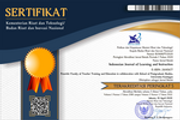E-LEARNING UTILIZATION TO IMPROVE THE STUDENTS’ LEARNING ACHIEVEMENT AT TELKOM UNIVERSITY BANDUNG
Abstract
The covid-19 pandemic has influenced many aspects in Indonesia, including education. Now, the method of teaching and learning in all levels of education is forced to implement the online learning. Telkom University has prepared previously by establishing The Center of e-Learning and Open Education (CeLOE) and developing the CeLOE Learning Management System (LMS) that would be used by all students and lecturers. Telkom foundation also provided E-Learning grants for the lectures to prepare their courses conducted online two years before the pandemic struck. Therefore, during the development process, not all courses were ready to be used online. There were also trials and errors that were needed to make it better and perfect. Therefore, this study aimed to analyze the utilization of E-Learning whether it affected the students’ learning achievement. For this research, the sample and population of this study are 88 international class students who take E-Commerce courses that has implemented LMS CELOE. The data were processed through computer assistance using the SPSS21 program and simple regression analysis techniques. The results of this study indicate that the variable X (E-learning utilization) has no effect on student achievement, E-Learning has not encouraged students to study independently and according to students, E-Learning has not saved overall education costs. The students still felt comfortable if they learnt directly with the lecturers, saw the figure of the lectures who taught them, asked, and discussed things they did not understand directly. Therefore, efforts are still needed to make students aware that learning is a necessity and must exist within themselves and should adapt to the new way of learning. Meanwhile, for the lecturers, they must still get the training in relation to design an interesting method in delivering the material to maximize the use of E-learning.
Keywords: e-learning; motivation; learning achievement.
Full Text:
PDFReferences
Adeed, P. (2018). Tiga Pilar Menanamkan Metode Pembelajaran Generasi Milenial. Retrieved July 18, 2020, from https://siedoo.com/berita-11628-tiga-pilar-menanamkan-metode-
Garrison, R. & Vaughan, N. D. (2008). Blended Learning in Higher Education: Framework, Principles, and Guidelines. WILEY Publisher.
Ibrahim, D. S. & Suardiman, S.P. (2014). Pengaruh Penggunaan E-Learning Terhadap Motivasi Dan Prestasi Belajar Matematika Siswa Sd Negeri Tahunan Yogyakarta. journal.uny.ac.id
Khoir, H. M., Murtinugraha, R. E., & Musalamah, S. (2020). Pengembangan media pembelajaran e-learning berbasis Moodle pada mata kuliah metodologi penelitian (Studi pada Program Studi Pendidikan Teknik Bangunan, Fakultas Teknik, Universitas Negeri Jakarta). Jurnal Pendidikan Teknik Sipil (JPenSil), 9(1), pp. 54-60.
Martoredjo, N. T. (2013). Meningkatkan prestasi belajar di perguruan tinggi dengan mengembangkan kecerdasan emosional. Humaniora,.4(2), pp.1093-1104
Nisa, L. C. (2002). Pengaruh pembelajaran e-learning terhadap hasil belajar matakuliah statistics mahasiswa tadris bahasa Inggris Fakultas Tarbiyah IAIN Walisongo. Jurnal Phenomenon, 2(1), pp.7-26.
Prasasti, S. & Prakoso, E. T. (2020). Karakter dan perilaku milineal:peluang atau ancaman bonus demografi. ONSILIA Jurnal Ilmiah BK, 3(1),pp.10-22.
https://ejournal.unib.ac.id/index.php/j_consilia
Pranoto, A. (2009). Sains dan Teknologi. Jakarta: PT Gramedia Pustaka Utama.
Sary, F. P. & Prasetio, A. (2021). Pengaruh pemanfaatan e-learning terhadap motivasi dan prestasi belajar pada mata kuliah e-commerce di Universitas Telkom Bandung. Edum Journal, 4(1), pp.29-39. https://edum.unwir.ac.id/index.php/edumjournal/article/view/75
Sari, W. F. & Kurniawati, T. (2020). Pengaruh motivasi belajar dan pemanfaatan e-learning terhadap prestasi belajar mahasiswa jurusan pendidikan ekonomi. Jurnal Ecogen, 3(1), pp.176-184. http://ejournal.unp.ac.id/students/index.php/pek/index
Tu’u, T. (2004). Peran Disiplin Pada Prilaku dan Prestasi Siswa. Jakarta: Grasindo
DOI: https://doi.org/10.25134/ijli.v4i1.4344
Refbacks
- There are currently no refbacks.
Copyright (c) 2021 Indonesian Journal of Learning and Instruction

This work is licensed under a Creative Commons Attribution-NonCommercial-ShareAlike 4.0 International License.

